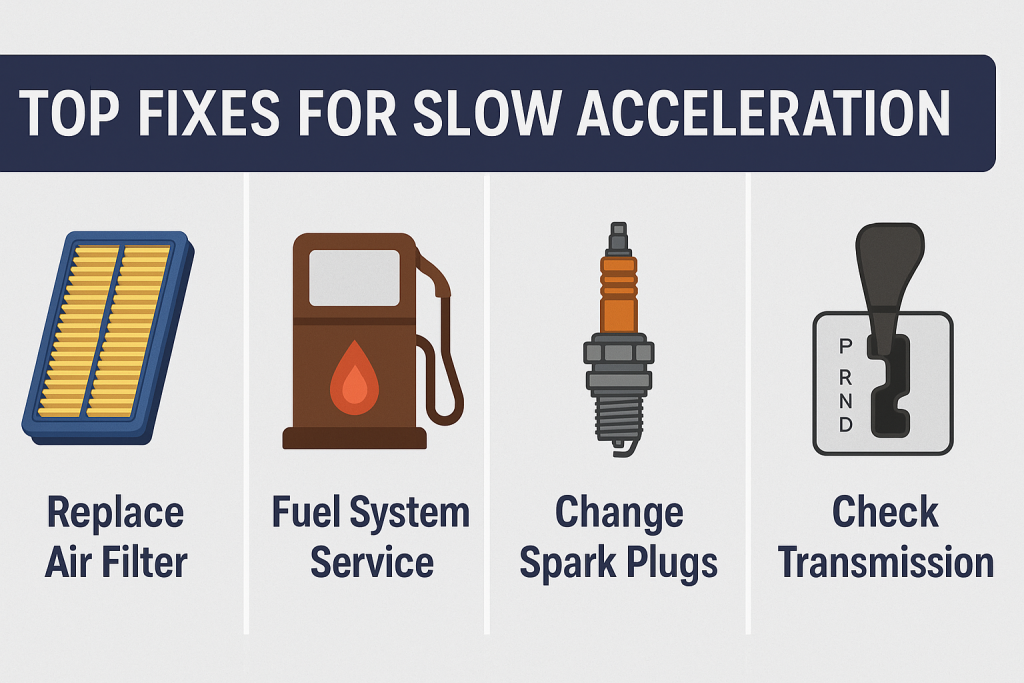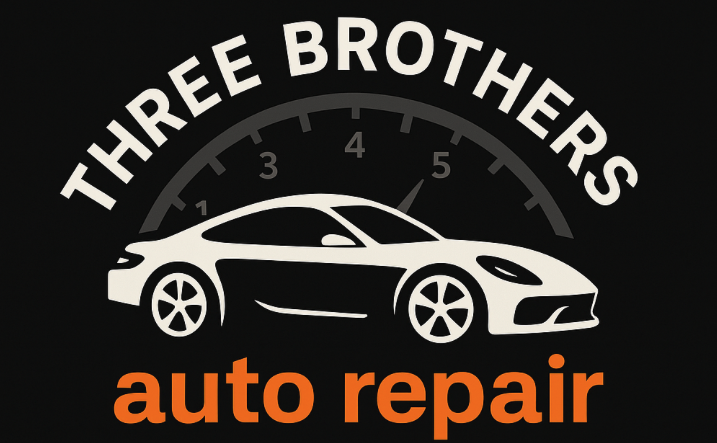Has your car ever felt sluggish when you hit the gas pedal? You press your foot down, expecting to zoom ahead, but the car just crawls forward. This lack of pep is not only frustrating, it can even be a little scary if you’re trying to merge onto a busy highway. A car that’s slow to accelerate (often called sluggish acceleration) means the vehicle isn’t responding with the power or speed you expect when you give it gas. The good news is that this problem is usually fixable. In this article, we’ll break down the most common causes of sluggish acceleration and what you can do to get your car’s get-up-and-go back.

- Common Causes of Sluggish Acceleration
- Dirty or Clogged Air Filter
- Fuel System Issues
- Worn or Faulty Spark Plugs
- Transmission or Clutch Problems
- Faulty Sensors (Engine Management Issues)
- What Can You Do? – Practical Fixes and Advice
- Do a Few Basic Checks Yourself:
- Don’t Ignore Routine Maintenance:
- Know When to Visit a Mechanic
- Get Your Car’s Pep Back – We Can Help! (Call-to-Action)
Common Causes of Sluggish Acceleration
Several issues can make a car feel slow or unresponsive. Here are the top causes, explained in everyday language:
Dirty or Clogged Air Filter
Your engine needs plenty of clean air to mix with fuel for combustion. If the air filter is clogged with dust and debris, it’s like trying to breathe through a stuffy nose – your car can’t get enough air. This can lead to weak acceleration or a jerky, hesitant feel when you press the gas. Fix: The solution is usually simple: check the air filter and replace it if it’s dirty. A new air filter lets your engine breathe easier and can immediately improve acceleration.
Fuel System Issues
Think of fuel as your car’s food. If it’s not getting fed properly, it won’t have energy to move. Common culprits are a clogged fuel filter or a weak fuel pump . A clogged fuel filter blocks the flow of gasoline (imagine trying to drink a thick milkshake through a narrow straw – not much comes through!). This starves the engine of fuel, causing sluggish acceleration. Similarly, dirty fuel injectors or a failing fuel pump can limit fuel flow. Fix: In many cases, replacing the fuel filter or cleaning the fuel system can restore proper fuel delivery. Using quality gasoline and maybe a fuel injector cleaner can also help keep the system clear. If the problem is the fuel pump, you’ll likely need a mechanic to replace it.
Worn or Faulty Spark Plugs
Spark plugs are tiny components that create a spark to ignite the fuel-air mixture in your engine. When they wear out or get fouled, they don’t fire properly. The result? The engine might misfire or run on fewer cylinders, and you’ll feel a lack of power when accelerating. It might even feel jerky or cause the engine to sputter. Fix: Luckily, spark plugs are a common maintenance item. If your car hasn’t had a tune-up in a long time, replacing the spark plugs (and maybe the ignition wires) can make a big difference. Fresh spark plugs help your engine run smoothly and accelerate strongly.
Transmission or Clutch Problems
Sometimes the issue isn’t with the engine’s power, but with getting that power to the wheels. If you have an automatic transmission and it’s slipping (or stuck in a higher gear), the engine may rev but the car barely accelerates. In a manual transmission car, a worn-out clutch can cause a similar feeling – the engine races, but the car is slow to respond. Fix:Transmission issues often need professional attention. For an automatic, a mechanic might check the transmission fluid or internal parts. For a manual, a clutch replacement might be in order. If you suspect this (for example, the engine RPM goes up but speed doesn’t), it’s time to visit a repair shop.
Faulty Sensors (Engine Management Issues)
Modern cars have various sensors (like the oxygen sensor, mass airflow sensor, or throttle position sensor) that tell the car’s computer how to mix fuel and air properly. If one of these sensors malfunctions, it can throw off the engine’s performance. For instance, a bad oxygen sensor might send wrong info and cause the engine to get too much or too little fuel. The car may then struggle to accelerate or hesitate because the engine isn’t running optimally. Fix: Often, when a key sensor goes bad, you’ll see the “Check Engine” light come on. At that point, the best step is to have a car diagnosticstest done (a mechanic will use a computer to read error codes). Replacing the faulty sensor can restore the car’s performance. This isn’t typically a DIY fix for most drivers, but the part itself is usually not extremely expensive and is a routine job for a professional.
Other Possible Causes: In some cases, less common issues like a clogged catalytic converter (part of the exhaust system) can cause a lack of power, or even something like dragging brakes (brake pads stuck) could make acceleration sluggish. However, the five causes above are the usual suspects to check first.
What Can You Do? – Practical Fixes and Advice
Dealing with a sluggish car can be simpler than it seems. Here are some practical steps and tips for everyday drivers in New Jersey (and anywhere):
Do a Few Basic Checks Yourself:
You don’t have to be a mechanic to do some quick troubleshooting:
-
Check your Air Filter: Locate your engine’s air filter (usually in a black box under the hood). If it looks extremely dirty or clogged with dust and leaves, consider replacing it. It’s one of the easiest and cheapest fixes for poor acceleration.
-
Note any Warning Lights: Is the check-engine light on? If yes, your car’s computer has detected a problem. This could point to a sensor issue or another engine problem. You can visit an auto parts store or an auto repair shop for a quick diagnostic scan to see what the code is.
-
Listen and Feel: Pay attention to how the car behaves. Does the engine stutter or misfire when accelerating? (That could be spark plugs or fuel issues.) Does the engine rev up high without much speed increase? (That could indicate a transmission or clutch slip.) Any unusual smells, like rotten eggs (which might hint at a bad catalytic converter)?
-
Fuel Up Wisely: If you suspect poor fuel quality, try refilling with high-quality gasoline from a reputable station. Occasionally, a tank of bad gas or low octane can make the car feel sluggish. Also, consider using a fuel system cleaner additive – it can sometimes help clear minor injector clogs.
Don’t Ignore Routine Maintenance:
As the saying goes, an ounce of prevention is worth a pound of cure. Many acceleration issues can be prevented by keeping up with regular maintenance. This includes:
-
Regular Oil Changes and Tune-Ups: Follow your vehicle’s recommended service schedule. Change spark plugs, ignition coils, and other tune-up parts as suggested by the manufacturer. A well-maintained engine will deliver smooth power.
-
Replace Filters on Time: Air filters and fuel filters should be replaced periodically. For example, an engine air filter is often changed every 12,000 to 15,000 miles (or as needed). Keeping these filters clean ensures the engine gets what it needs (air and fuel) without restriction.
-
Use Quality Fluids and Fuel: Ensure your transmission fluid is at the right level and replaced at the recommended intervals. Use good quality fuel – it can keep the fuel system and injectors cleaner. These small things help your car run its best.
-
Watch for Changes: If you notice your car gradually losing its pep, don’t wait for it to get worse. Sometimes addressing a small issue (like a slight misfire or a dirty throttle body) early can prevent a big repair later.
Know When to Visit a Mechanic
Basic checks are great, but some problems require professional expertise. If you’ve tried the simple stuff or if you’re not comfortable poking around under the hood, it’s time to let a mechanic take a look. This is especially true for complex issues like transmission problems or advanced engine diagnostics. A certified technician can perform a comprehensive diagnostic test (using specialized equipment to read sensor data and error codes) to pinpoint exactly why your car is slow to accelerate. Remember, driving for too long with severe sluggishness isn’t just annoying – it could be unsafe and might lead to further engine damage. So, when in doubt, have it checked out!
Get Your Car’s Pep Back – We Can Help! (Call-to-Action)
If you’re in New Jersey and your car is struggling to get moving, Three Brothers Auto Repair NJ is here for you. We are a trusted shop for auto repair in New Jersey, and our experienced team can diagnose and fix acceleration issues in no time. With our advanced New Jersey car diagnostics equipment, we’ll identify the exact cause of your car’s sluggish performance and get you back on the road with confidence.
Don’t wait until a small acceleration issue becomes a big problem. Swing by Three Brothers Auto Repair in East Rutherford, NJ, or give us a call to schedule a check-up. Our friendly mechanics will treat you like family and make sure your car accelerates smoothly and safely. Whether it’s a simple filter replacement or a more complex repair, you can trust us to handle it.
Your car’s health is our priority – let us help you enjoy a responsive, zippy ride again. Come visit Three Brothers Auto Repair, and experience top-quality service that keeps New Jersey drivers moving forward!
